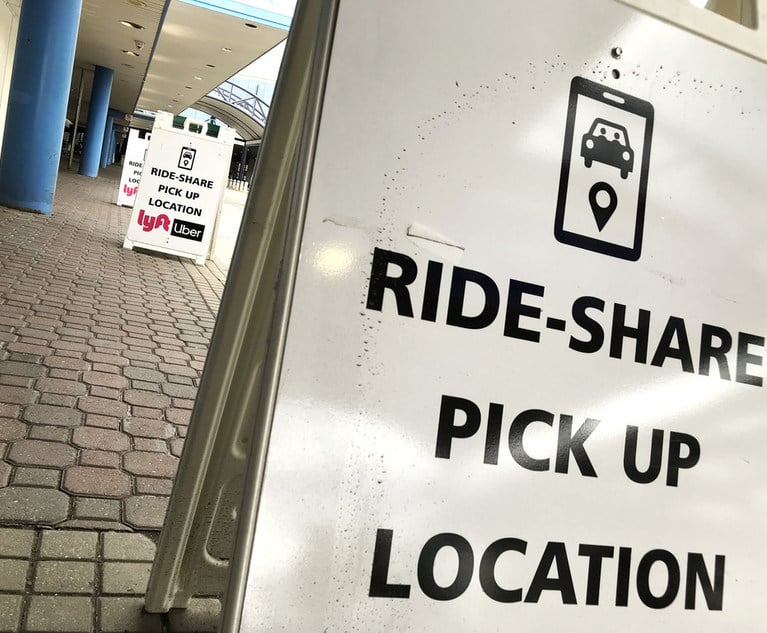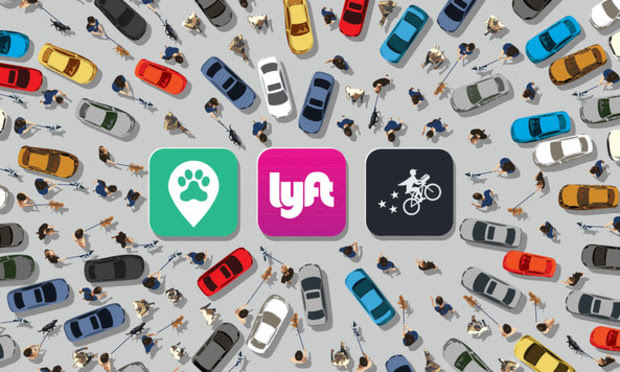Labor of Law: EEOC's Reflections on #MeToo | Sizing Up the Gig Workforce | Plus: The Latest Laterals & More
We've got highlights from the EEOC's sexual harassment task force meeting, where management-side and plaintiffs lawyers made observations about #MeToo and what's next. Plus: scroll down for who got the work in some of big cases, and check out the latest on the moves front. Thanks for reading!
June 14, 2018 at 12:00 AM
10 minute read
Welcome to Labor of Law. Lawyers can play a central role in the #MeToo movement but there's disagreement over how best to minimize workplace sexual harassment. Plus: The Labor Department's issued a long-awaited report measuring the scope of the gig economy: What the report tells us and what it doesn't. Scroll down for who got the work and the latest lateral moves. Outten & Golden has named its new D.C. partner-in-charge.
➤➤ I'm Erin Mulvaney in Washington, D.C., covering labor and employment from the Swamp to Silicon Valley. Follow this weekly newsletter for the latest analysis and happenings — and tell your friends to subscribe! If you have a story idea, feedback or just want to say hi, I'm at [email protected] and on Twitter @erinmulvaney. Let's get started.
Amid #MeToo, 'This Is a Tremendous Time'
The #MeToo movement sparked questions about workplace power structures and ended the careers of many prominent men across industries. Lawyers are playing centrals role in speaking out with victims, exposing alleged abuses—and helping craft sustainable workplace policies. Here's a snapshot of what some advocates are saying about their work—and what's ahead.
“This is a tremendous time. It's not a typical moment and it took more than typical strategies,” Fatima Goss Graves, president of the National Women's Law Center, said last week at the American Constitution Society conference in Washington. Graves said the legal fund the group is administering attracted 3,000 people who are seeking assistance for alleged retaliation for harassment at work. More than 500 attorneys have joined the #TimesUp Legal Defense Fund.
“What has happened is a cultural change. It hasn't been law and policy. We are going to have to see policy and politics catch up,” Graves said.
➤➤ Cohen Milstein Sellers & Toll partner Kalpana Kotagalsaid sexual harassment shouldn't be divorced from other gender-based discrimination in the workplace. Companies that are announcing an end to forced-arbitration on sexual harassment issues miss the mark, Kotagal (at right) said.
be divorced from other gender-based discrimination in the workplace. Companies that are announcing an end to forced-arbitration on sexual harassment issues miss the mark, Kotagal (at right) said.
“It's all about identifying the structures that allow this behavior to happen. What's happening in HR? Or the leadership of the company that allows that to go on?” Kotagal said. “One of the struggles that goes on is how can we identify the patterns where there is so much secrecy. That's what we would say. Where is the exposure, the risk?”
➤➤ Challenges and tension remain, especially concerning the scope of nondisclosure agreements. Retired federal judge Shira Scheindlin, of counsel atStroock & Stroock & Lavan, said nondisclosure agreements can benefit the company and the alleged victim of workplace misconduct. “There are a lot of people who don't want this banned entirely,” she said. “Plaintiff victims don't want these cases to be public. They also want a settlement. The nondisclosure is what the company wants.”
These issues all got a fresh look earlier this week at an EEOC task force hearing centered on sexual harassment. Commission members heard testimony from a variety of vantages, including management-side and plaintiffs attorneys. (Here's a linkto my report at the National Law Journal.)
Proskauer Rose partner Kathleen McKenna said there was nothing “sinister” in the use of nondisclosure agreements and mandatory arbitration. Civil rights attorneyDebra Katz of Katz, Marshall & Banks confronted gaps in federal law that she contends hurt workers, especially “those in low-wage jobs who are vulnerable to retaliation.”
➤➤ EEOC acting chair Victoria Lipnic says there hasn't been a spike in sexual harassment cases at the EEOC, a data point that grabbed a few headlines from the meeting. Lipnic and Chai Feldblum, co-leaders on the EEOC sexual harassment task force, said they believe companies have seen an increase in internal reporting. “It shows that people are feeling safer and making use of internal systems in ways they haven't before,” Feldblum said.
They also noted that there's also a rise in companies engaging with insurance carriers about employment practices liability. There's been some reporting on that front, including this expert piece at The Recorder, our California publication.
“Employers should take note, these policies will not cover punitive damages in California and perhaps elsewhere. And, when these cases are put in front of a jury, punitive damages can be huge and devastating,” lawyers from Kabateck Brown Kellner wrote.
How Big Is the Gig Economy? What We Know and What We Don't.
One of the big issues in the rise of the gig economy focused on just how big is it, really? Giving an actual number to the size of the workforce of innovative on-demand businesses has remained elusive.
The Labor Department's Bureau of Labor Statistics released a long-awaited report that attempted to measure the scope of the contingent workforce, to give policymakers and academics an idea of what's next to jumpstart solutions.
The numbers were less dramatic than some observers might have expected. The number of workers analyzed in the Contingent and Alternative Employment Arrangements showed the gig economy has fallen since the workforce was last tracked in 2005. Many academic studies over the years have found the opposite and concluded that the gig economy, while still a small part of the overall economy, is rapidly growing.
According to the report, those workers who characterize themselves as independent contractors shrunk from 7.4 percent in 2005 to 6.9 percent in 2017. Fisher Phillipspartner Richard Meneghello in Portland suggests that we don't jump to conclusions based on these numbers.
“Some critics, though, are pointing out that this data is corrupted and doesn't necessarily prove that the gig economy is shrinking. Most notably, the report did not even include that very large segment of the American workforce that uses gig economy jobs to supplement their existing income at another full-time or part-time job,” Meneghello writes in a blog post. “Instead, if a worker has a main job doing something else—even if this main job is simply a part-time hourly position—they were not included as a gig worker in this report.”
Workers who chose to work for app-based food delivery services and ride-sharing companies often pick up the work as additional or side income. Meneghello suggests that not tracking this is “an awfully big oversight that might cause one to ignore the data altogether.”
>> The Labor Department in September is expected to release more information on those workers who picked up jobs through digital means.
“So can we trust the data? It's hard to say. It's important to remember that the survey includes self-reported data, meaning that workers complete the information themselves and it is not verified by hiring entities. Moreover, the demarcation between categories—as well as the characterization of the categories themselves—are somewhat confusing,” Meneghello says.
Who Got the Work
➤➤ A former supervisor at the gunmaker Smith & Wesson Corp. brought federal whistleblower claims alleging he was retaliated against after raising a complaint about alleged misconduct at the company. The complaint, in the Northern District of Illinois, was filed by John Lee of Lee & Breen. A team from Proskauer Rose—Connie Bertram and Emilie Adams—were representing Smith & Wesson at the U.S. Labor Department, where the employee's claims had been pending.
➤➤ Jones Day and Nelson Mullins lawyers represented CSX Transportation Inc. in an EEOC sex discrimination case that was resolved this week in a $3.2 million settlement. EEOC alleged CSX's physical strength tests discriminated against women. Read the consent order here in West Virginia federal district court.
➤➤ A federal appeals court last week reversed a $307,0000 attorney fee award that was granted to CVS Pharmacy Inc.'s lawyers at Jones Day in a dispute the company won against the U.S. Equal Employment Opportunity Commission. CVS, represented by Jones Day's Eric Dreiband, said attorney fees were justified for the EEOC's “baseless” lawsuit and that regulators had unfairly targeted the company for alleged employment abuses.
➤➤ A Brooklyn federal judge has denied Uber's bid to arbitrate a disabled rider's case. The judge found that the ride-hailing company's arbitration clause was too ambiguous. David Schwartz, a partner at Gerstman Schwartz & Malito, appeared for the plaintiff Elizabeth Ramos. Andrew Spurchise of Littler Mendelson appeared for Uber in the case. My colleague Andrew Denney has more here.
Notable Moves, New Hires & Promotions
Outten & Golden has named Susan Huhta the partner-in-charge of the firm's Washington office, succeeding P. David Lopez, the former Obama-era EEOC general counsel who's becoming dean of Rutgers School of Law (Newark.) Lopez will remain of counsel to the firm. Additionally, Sally Abrahamson was named head of Outten & Golden's class practice area in the D.C. office. The firm said Melissa Pierre-Louis, a partner, would relocate from the New York office to D.C. “We are very pleased with the continuing and enhanced roles that Sue, Melissa, and Sally will play in the future of the firm and its DC office,” Wayne Outten, the firm's managing partner, said in a statement.
Meanwhile, new associates will join Outten & Golden in New York, Washington and San Francisco. In New York: Sabine Jean of UCLA School of Law, Lauren McGlothlin from Boston College of Law School, Fahreen Velji of Case Western Reserve School of Law and Shane Young from the University of California Berkeley School of Law. In D.C., Mikael Rojas, a Stanford Law School graduate, will join the firm. Laura Iris Mattes, from University of California, Berkeley School of Law, will join the firm in San Francisco.
→ Scott Nelson joins Seyfarth Shaw's labor and employment team in Houston. Nelson joins from Baker McKenzie, where he was a partner and served until recently as the leader of the firm's domestic U.S. employment counseling and litigation practice.
→ Fisher Phillips has named Southern California-based partner Regina Petty as its first chief diversity officer. Petty will be charged with heading up the firm's efforts to create and maintain a diverse and inclusive work environment.
→ Wells Fargo & Co. snagged David Galloreese to lead the company's HR department. Galloreese formerly held the top HR post at Sam's Club.
→ Brendan Sweeney joined the Long Island office of Jackson Lewis as of counsel. He most recently worked at Seyfarth Shaw, and has also served as global head of litigation and employment law for Luxottica, the eyewear firm.
Around the Water Cooler…
>> A new study shows most law firms are mum on whether they required mandatory arbitration for summer associates. [The American Lawyer]
>> Microsoft faced scrutiny in a Seattle court this week over claims that its policies are biased against women. The women argue alleged systemic discrimination continues, despite the company's worker friendly image and attempts to promote progressive policies. [Bloomberg]
>> In San Francisco this week, Tesla faced a National Labor Relations Board administrative hearing over claims the company tried to intimidate workers against unionizing. The company's general counsel, Mark Ross, tried to keep Elon Musk's name from coming up. The judge denied the request. [Buzzfeed]
>> David Weil, the Obama-era Labor Department's wage-and-hour chief, says Hollywood-style unions—known technically as autonomous unions—are a “compelling” model for putting more power in the hands of contingent workers. [Politico]
>> The National Labor Relations Board will analyze the agency's ethics and recusal policies as part of the fallout from a former Littler Mendelson partner's controversial vote in a joint-employment case. [Reuters]
That's all for this week. Shoot me a note with tips or story ideas to [email protected]. Thanks, as always, for reading.
This content has been archived. It is available through our partners, LexisNexis® and Bloomberg Law.
To view this content, please continue to their sites.
Not a Lexis Subscriber?
Subscribe Now
Not a Bloomberg Law Subscriber?
Subscribe Now
NOT FOR REPRINT
© 2025 ALM Global, LLC, All Rights Reserved. Request academic re-use from www.copyright.com. All other uses, submit a request to [email protected]. For more information visit Asset & Logo Licensing.
You Might Like
View All
Labor of Law: As Workers Suffer With Long Covid, Employers May Rethink Accommodations for Other Disabilities

Labor of Law: Federal Noncompete Ban Would Be Far From Last Word on Issue

Labor of Law: New Federal Rule Could Upend State Efforts to Count Ride-Share Drivers as Contractors

Labor of Law: Employer Statements on Abortion Could Spur Discrimination, Hostile Work Environment Claims
Trending Stories
- 1'It's Not Going to Be Pretty': PayPal, Capital One Face Novel Class Actions Over 'Poaching' Commissions Owed Influencers
- 211th Circuit Rejects Trump's Emergency Request as DOJ Prepares to Release Special Counsel's Final Report
- 3Supreme Court Takes Up Challenge to ACA Task Force
- 4'Tragedy of Unspeakable Proportions:' Could Edison, DWP, Face Lawsuits Over LA Wildfires?
- 5Meta Pulls Plug on DEI Programs
Who Got The Work
Michael G. Bongiorno, Andrew Scott Dulberg and Elizabeth E. Driscoll from Wilmer Cutler Pickering Hale and Dorr have stepped in to represent Symbotic Inc., an A.I.-enabled technology platform that focuses on increasing supply chain efficiency, and other defendants in a pending shareholder derivative lawsuit. The case, filed Oct. 2 in Massachusetts District Court by the Brown Law Firm on behalf of Stephen Austen, accuses certain officers and directors of misleading investors in regard to Symbotic's potential for margin growth by failing to disclose that the company was not equipped to timely deploy its systems or manage expenses through project delays. The case, assigned to U.S. District Judge Nathaniel M. Gorton, is 1:24-cv-12522, Austen v. Cohen et al.
Who Got The Work
Edmund Polubinski and Marie Killmond of Davis Polk & Wardwell have entered appearances for data platform software development company MongoDB and other defendants in a pending shareholder derivative lawsuit. The action, filed Oct. 7 in New York Southern District Court by the Brown Law Firm, accuses the company's directors and/or officers of falsely expressing confidence in the company’s restructuring of its sales incentive plan and downplaying the severity of decreases in its upfront commitments. The case is 1:24-cv-07594, Roy v. Ittycheria et al.
Who Got The Work
Amy O. Bruchs and Kurt F. Ellison of Michael Best & Friedrich have entered appearances for Epic Systems Corp. in a pending employment discrimination lawsuit. The suit was filed Sept. 7 in Wisconsin Western District Court by Levine Eisberner LLC and Siri & Glimstad on behalf of a project manager who claims that he was wrongfully terminated after applying for a religious exemption to the defendant's COVID-19 vaccine mandate. The case, assigned to U.S. Magistrate Judge Anita Marie Boor, is 3:24-cv-00630, Secker, Nathan v. Epic Systems Corporation.
Who Got The Work
David X. Sullivan, Thomas J. Finn and Gregory A. Hall from McCarter & English have entered appearances for Sunrun Installation Services in a pending civil rights lawsuit. The complaint was filed Sept. 4 in Connecticut District Court by attorney Robert M. Berke on behalf of former employee George Edward Steins, who was arrested and charged with employing an unregistered home improvement salesperson. The complaint alleges that had Sunrun informed the Connecticut Department of Consumer Protection that the plaintiff's employment had ended in 2017 and that he no longer held Sunrun's home improvement contractor license, he would not have been hit with charges, which were dismissed in May 2024. The case, assigned to U.S. District Judge Jeffrey A. Meyer, is 3:24-cv-01423, Steins v. Sunrun, Inc. et al.
Who Got The Work
Greenberg Traurig shareholder Joshua L. Raskin has entered an appearance for boohoo.com UK Ltd. in a pending patent infringement lawsuit. The suit, filed Sept. 3 in Texas Eastern District Court by Rozier Hardt McDonough on behalf of Alto Dynamics, asserts five patents related to an online shopping platform. The case, assigned to U.S. District Judge Rodney Gilstrap, is 2:24-cv-00719, Alto Dynamics, LLC v. boohoo.com UK Limited.
Featured Firms
Law Offices of Gary Martin Hays & Associates, P.C.
(470) 294-1674
Law Offices of Mark E. Salomone
(857) 444-6468
Smith & Hassler
(713) 739-1250










